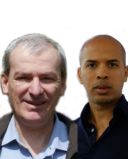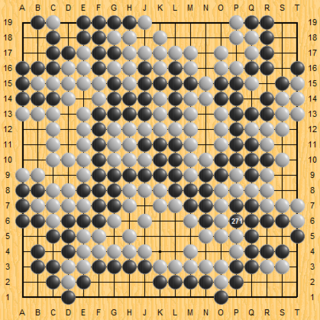
The world of Go is in a state of shock, as we have reported in a previous post. For the first time ever, a computer program has beaten a professional player. The computer program behind this feat, AlphaGo, is developed by Google Deep Mind, and uses several cutting-edge techniques (see our previous post for details). The result was ground-breaking because Go – an Asian game with many more possibilities than chess – was seen as the holy grail of AI. It was thought that computers should be able to display intuition in order to play at a top level – now it seems that they can do it.
Things could get worse very soon for humankind. From March 9th to March 15th, AlphaGo will play against 9-dan Lee Sedol (South Korea), one of the top players in the world. The match will take place in Seoul and will be played over five games, with a $1 million prize. Will Lee Sedol defend the last bastion of human pride against AI?

South Korea is one of the leading countries of Go, where it is called “baduk” rather than the Japanese name. (Perhaps AlphaGo should be renamed AlphaBaduk for this match). Thirty-three year old Lee Sedol is confident that he will win, but the Go community is not so sure.
On the positive side, Lee Sedol is much stronger than Fan Hui, the 2-dan professional and European champion who lost 0 – 5 to AlphaGo last October. The difference is similar to the difference, in chess, between a Master and a top Grandmaster. Lee Sedol is expected to win most of the games against Fan Hui.
On the negative side, Fan Hui lost all the games of the match, which clearly indicates that AlphaGo is much superior to a 2-dan professional. It is also likely that Google Deep Mind will use an improved version. For example, AlphaGo has taken advantage of five additional months of learning since October, with more master games, to improve its evaluation of the positions and its move selection. It might also use more powerful hardware, and also employ an opening database, which it did not do in the previous match. This would enable it to take advantage of human knowledge in the first moves and thus avoid inferior opening lines.
What strategy should Lee Sedol adopt?
Some might dismissively claim that pressure performing is “all in your head” but, as a new study revealed (Chib, Shimojo, & O'Doherty, 2014), pressure leaves a real neurological footprint inducing people to “choke“ and perform below their level of ability. Sedol will be under considerable psychological pressure during the match, given the world attention it will raise. He seems confident and already talks about a rematch, which is a good attitude unless it becomes overconfidence. In his match against Deep Blue in 1997, world chess champion Gary Kasparov did not handle the pressure well and made serious blunders (Hsu, 2002). There are several techniques Sedol can use to prepare himself psychologically. He can play against computer programs, so that he gets used to play machines. As available computer programs are much weaker than AlphaGo, he should select difficult positions that he would then play against the computer; this includes games where he starts with material handicap. Obviously, he should practice with the time control agreed upon for the match.
If possible, he should look at games played by Alpha-Go so that he can identify specific weaknesses. Ideally, the contract of the match should have stipulated that the Alpha-Go team should supply such games regularly during the match preparation. Given the publicity that the contest will create, we doubt that this is the case. In general, AlphaGo’s strength is also its weakness: it needs millions of positions to learn and uses large numbers of master games, because there are much fewer games of top-level players competing against one another. Thus, its play is modeled on the play of masters rather than top-level players. Masters are obviously weaker than top-level players, and a world-class player such as Lee Sedol should be able to take advantage of this relatively inferior knowledge. However, AlphaGo also learns by self play. To which extent this compensates the kind of games used for learning is unknown, and might well be the decisive factor of the match.
While excellent at pattern recognition, which is often considered as the hallmark of human expertise (Gobet, 2015), AlphaGo is weaker when it comes to look-ahead search. This is because the way it carries out search is statistical rather by examining critical lines. In this respect, it is the opposite of Deep Blue, which was optimized for accurate search. Lee Sedol might take advantage of this by choosing positions containing tactical variations, where the judgment depends on a few critical moves. AlphaGo’s statistical search might miss these subtleties and go for lines that are supported by the vast majority of moves but refuted by a single move.
For Lee Sedol, the dilemma will be whether he should play as he would against humans or change his style to hopefully take advantage of AlphaGo’s weaknesses. There is danger in doing the latter. Research on chess has shown that players, when they play outside the style they specialize in, perform at a weaker level (Bilalić, McLeod, & Gobet, 2009). This conclusion is likely to apply to Go as well. In addition, trying to anticipate AlphaGo’s way of thinking will engage cognitive resources that are then not used for playing Go well.
In spite of AlphaGo’s formidable computational powers and its remarkable pattern recognition abilities, Lee Sedol has a much deeper understanding of the game. Thus, given the uncertainties about AlphaGo’s real strength, our advice to him is to start the match by playing the kind of game in which he normally excels. Only if things turn sour should he try to apply methods aimed at directly taking advantage of AlphaGo’s (presumed) weaknesses.
Fernand Gobet and Morgan Ereku
References
Bilalić, M., McLeod, P., & Gobet, F. (2009). Specialization effect and its influence on memory and problem solving in expert chess players. Cognitive Science, 33, 1117-1143.
Chib, V., Shimojo, S., & and O'doherty, J. (2014). The effects of incentive framing on performance decrements for large monetary outcomes: behavioural and neural mechanisms. The Journal of Neuroscience, 34, 14833-14844.
Gobet, F. (2015). Understanding expertise: A multidisciplinary approach. London: Palgrave.
Hsu, F.-H. (2002). Behind Deep Blue: Building the computer that defeated the world chess champion. Princeton, NJ: Princeton University Press.



